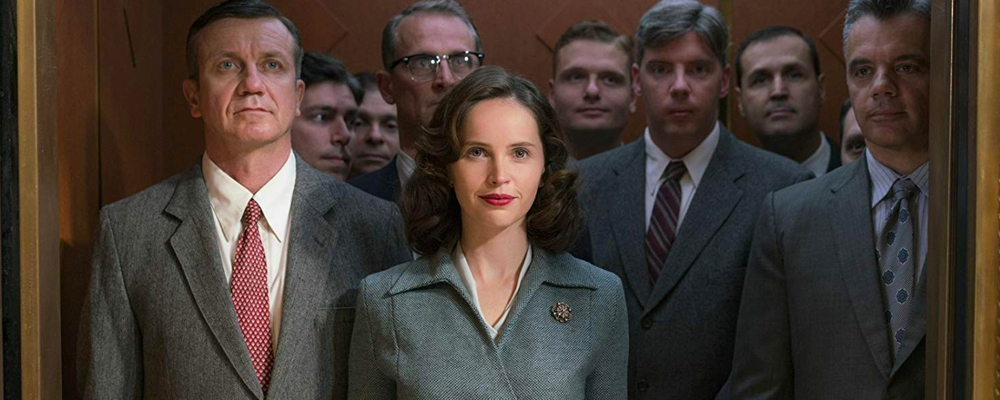‘On the Basis of Sex’ Dramatizes Ruth Bader Ginsburg’s Fight for Equality in Historic Case
Alci Rengifo
Before she made history by being selected to the Supreme Court, Ruther Bader Ginsburg had made a name for herself as a brilliant legal scholar and challenger of the country’s sexually discriminative legal codes. “On the Basis of Sex” dramatizes her first major victory in the courtroom, when as a young professor she took on a rare case in which the discriminated party happened to be a man. It’s a feel good movie that rarely strays from the public image of Ginsburg, telling her story in heroic brushstrokes and inspiring language. But its message is important and ever so relevant, even as we smile at the cheesy approach, we are informed and riveted by the history.
The film opens at Harvard Law School where Ginsburg (Felicity Jones) is entering a world where it’s only been six years since women have been allowed to attend. The dean, Erwin Griswold (Sam Waterston) is keen on openly questioning the comparisons between men and women in society. Ginsburg has the double mark of being both a woman and Jewish, which in the Ivy League invites greater scrutiny. But Ginsburg pulls through even as her fellow law student husband Martin (Armie Hammer) battles testicular cancer. Once graduated Martin begins rising as a lawyer while Ginsburg can only seem to find work as a professor, especially since they are now raising children as well. But she is hungry to prove herself on a grander arena, in particular because the 1970s are bringing immense changes and social tremors. The sexual revolution is in full swing and Ginsburg begins to feel that now is the time to question the many laws which discriminate on the basis of sex. The perfect chance presents itself when a man named Charles Moritz (Chris Mulkey) is denied a tax deduction for caring for his ailing father. The subtext of the legal code was that an unmarried man had no right to a deduction for services usually expected of a woman. Ginsburg takes on the case as a first step in challenging all gender-discriminatory legalities in the American system.
“On the Basis of Sex” is both a fun and informative movie because its own production is a testament to the Ginsburg legacy. The director is Mimi Leder, a filmmaker of titles both large and small, who has risen in an industry that remains quite male-dominated. The screenplay is by Daniel Stiepelman, Ginsburg’s own nephew. It functions more as a labor of love, with Ginsburg and Martin written almost as tributes to the real people. Their marriage is a perfect symbiosis of progressive mindsets, with Martin doing the cooking and child-rearing while Ginsburg works teaching and later tackling the Moritz case. Even when illness strikes the two are never less than supportive and pillars of endurance, in good health Ginsburg’s only real qualm is that Martin overshadows her at dinner parties. But at home the man can even do flambé. “My wife and I always looked to them as our role models,” Stiepelman recently told Entertainment Voice, “They both propped each other up career wise, which at the time that was revolutionary. But they were also equal partners at home…I first heard this story at their funeral. Someone got up and shared about how this was the only case that Ruth and Marty ever argued together. I thought it would be a great movie.”
If the marriage is near perfection, what generates tension in the story is the fact that Ginsburg was challenging not just a law, but a cultural mindset. Even when she approaches ACLU legal director, and old friend, Mel Wolf (Justin Theroux) about the Mortiz case he nearly scoffs. At the time anti-war protests and civil rights still took precedence over the nation’s sexual norms. The early scenes at Harvard harshly bring home the realities of the times. During a lecture a professor asks the class questions but purposefully ignores Ginsburg when she raises her hand to answer. Denizens at dinner parties see her as the cute wife. The brilliant masterstroke in taking on the Mortiz case was that Ginsburg shattered the discriminative nature of the law by exposing how it can be unfair to men as well. Why can’t a man be expected to be a caregiver? What if he has no choice? Once the case goes to the Supreme Court Leder truly finds the strongest center for the material, portraying the judges as keepers of an old order, exposing their own gender prejudices by asking Ginsburg questions about women in the home which today would seem (hopefully) so prehistoric. Even if we have seen this sort of movie countless times, where the historical persona rises to the occasion, delivering the blistering speech or argument that will sway the system, in this case there is a particular power because of just how formidable Ginsburg’s task was. We can forgive the movie its faults, which never turn the film into a bad time, because we sense it’s all being made with real heart.
The performances make the material work because the talent is so high it elevates even the script’s romanticized tone to something more engaging. Felicity Jones as Ginsburg finds a nice balance between seeming stuffy and endearing. Part of Ginsburg’s impact was precisely that she was not a campus radical or bra-burning protester, even her daughter Jane (Cailee Spaeny) gets frustrated with her mother’s more conservative habits, like dismissing cat calls in public. The supporting roles are colorful in that feel good movie sort of way, especially Justin Theroux as the supportive but short-tempered Wolf. Armie Hammer smoothly pulls off the role of Martin, capturing him as a nice guy version of Ivy League. Kathy Bates is rebellious fun as legendary feminist lawyer Dorothy Kenyan, bringing a much needed fire to Ginsburg’s environment.
“Growing up the image I always had of a feminist was Gloria Steinem, you know, bringing audiences up to the feet. But as kid people would say, ‘there’s your aunt Ruth, she changed the world.’ And I would think ‘that quiet woman?’ The fact that you needed both, you need a Gloria Steinem that will change the culture and you need a Ruth Bader Ginsburg who will change the institutions, and the law, that is for me the huge takeaway from the film,” shared Stiepelman regarding his aunt’s legacy. “On the Basis of Sex” argues the case well that while every era has its revolutionaries, not all of them wear berets or partake in riots, some wield the powerful tool of a keen mind.
“On the Basis of Sex” opens Dec. 25 in select theaters, expanding nationwide Jan. 11.





